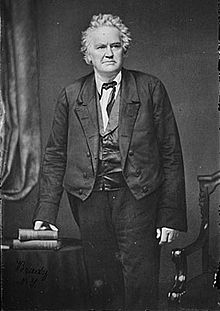Get Today in Masonic History into your Inbox. Sign up today for one of our email lists!
Need an article for your Trestleboard/Newsletter see our Use Policy
Joshua Reed Giddings is Born

Today in Masonic History Joshua Reed Giddings is born in 1795.
Joshua Reed Giddings was an American politician and abolitionist.
Giddings was born on October 6th, 1795 in Tioga Point, Pennsylvania, which is now Athens, Pennsylvania. In 1806 his father moved the family to Ohio. Giddings did not have any formal education, he spent his free time self educating by studying and reading books. At the age of 17 he enlisted in a local militia to fight in the War of 1812. He served five months, mostly fighting against native American tribes allied with the British. After the war he was a schoolteacher briefly while he read law.
In 1821, Giddings was admitted to the bar in Ohio, establishing a successful practice. In 1837 he was forced to close the practice when the Panic of 1837 largely wiped out his personal fortune.
In 1838, Giddings began his political career. He ran for the United States House of Representatives representing the 16th Congressional District of Ohio. After successfully winning the seat, he won three more times, before being elected as the representative to the 20th Congressional District of Ohio. Giddings served from 1838 until 1859 in the United States House of Representatives. Over this period his political affiliation changed from Whig, Free Soiler, Opposition Party and finally Republican.
In 1841, at the beginning of the session, Giddings and some of his colleagues, which included Seth M. Gates of New York, William Slade of Vermont, Sherlock J. Andrews of Ohio, and several others, formed the Select Committee on Slavery. The Committee was not official and the members of the committee paid their own expenses. They also had powerful support in John Quincy Adams, who was not a member of the committee but supported their efforts. Among the expenses the committee had was paying Theodore Dwight Weld, a prominent Abolitionist lecturer.
Giddings often spoke out about slavery and in 1841 he spoke out about the Creole Case. The case involved a slave ship where the slaves on board revolted and took over the ship. They pulled into the Bahamas where slavery had been made illegal by the British Government. The British Government declared the slaves free and Southern slave owners argued the ship was sailing under an American Flag and the slaves on board were the property of the United States. Southern slave holders demanded the Federal Government retrieve the ship and the slaves. Giddings argued slavery was a state institution and the Federal Government should not be turning it into a Federal institution by stepping into the Creole incident. He also argued the coastwise slave trade, it was also called the domestic slave trade, was outlawed since 1808 preventing slaves from being brought in from Africa (smuggling still occurred), and should not be protected by the Federal Government since it did not recognize the institution of slavery.
The case of the Creole was fought out in court, before it was settled, Giddings went to the Floor of the House with a series of resolutions to declare the slaves on the Creole had violated no United States laws. The House had issued a gag order preventing it from being discussed. He was formally censured for violating the gag order and was not allowed to speak in the House, even in his own defense. He resigned and took his case to his constituents. He was reelected in the special election by the greatest margin of victory in the history of either house of Congress.
In the 1850's Giddings gave a speech calling out the caning of Senator Charles Sumner. In the speech he said the incident was a crime "against the most vital principles of the Constitution, against the Government itself, against the sovereignty of Massachusetts, against the people of the United States, against Christianity and civilization." The incident came when a Senator from South Carolina, Preston Brooks, physically assaulted Senator Sumner after he gave a speech against slavery and disparaged a relative of Brooks. The day after the speech Brooks beat Sumner with his cane, almost killing Sumner. The incident is an example of the deteriorating civility in dialog which eventually led to the American Civil War.
Giddings was not afraid to use violent language in his anti-slavery speeches and even encouraged runaway slaves to shoot at their pursuers. Although Giddings campaigned for Abraham Lincoln, the idea of using violence to oppose slavery was where the two men found themselves on opposite ends of the debate.
In 1859, Giddings was not renominated to Congress. In 1861, Lincoln appointed him the United States Consul General in Canada. Giddings passed away in Montreal, Quebec, Canada on May 27th, 1864.
Giddings was a member of Jerusalem Lodge No. 19 in Hartford, Ohio.
This article provided by Brother Eric C. Steele.

